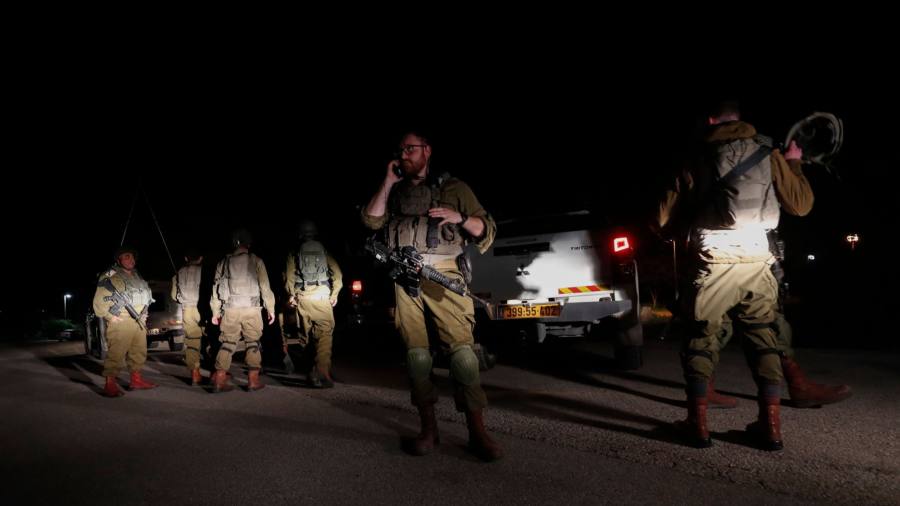Israel’s air force struck targets in Syria on Sunday, after militants in the neighbouring country fired rockets towards Israel, capping a week of tensions ignited by a police raid at Jerusalem’s al-Aqsa mosque.
The latest burst of violence added to fears of a broader escalation. It followed a tense 48 hours in which Israel bombed southern Lebanon and the Gaza Strip in response to rocket fire, and twin attacks in Israel and the occupied West Bank that killed two British-Israelis and an Italian tourist.
Israel’s military said it hit several targets in Syria in the early hours of Sunday, including rocket launchers, military radar systems, artillery posts and a Syrian army compound.
It launched the strikes after six rockets were fired from Syria towards Israel, setting off sirens in the Golan Heights, which Israel seized from Syria in 1967, and annexed in 1981 in a move not recognised by most of the international community. One rocket was intercepted, and two fell on open ground.
Arabic media said a Palestinian militant group in Syria had claimed responsibility for the rocket fire.
Syria’s Sana state news agency said the Israeli strikes targeted areas in the south of the country and had caused “some material damage”. There were no immediate reports of casualties.
The latest cycle of violence began after Israeli police raided the al-Aqsa mosque on consecutive nights last week to remove Palestinians trying to remain in the compound, known to Jews as the Temple Mount.
Footage of heavily armed Israeli forces beating Palestinians in the mosque with rifle butts and batons sparked outrage in the Arab world. On Thursday, militants in Lebanon fired 34 rockets at Israel, the biggest barrage from the country since Israel and the Iran-backed group Hizbollah fought a 34-day war in 2006, sparking retaliatory strikes by Israel.
The cross-border exchange ended without fatalities. But hours later, two Israeli sisters were killed, and their mother was left fighting for her life after their car came under fire near a Jewish settlement in the West Bank.
Then on Friday night, an Italian tourist was killed and five others were injured when a car ploughed into pedestrians on a cycle path near the beach in Tel Aviv. Police identified the driver, who was shot dead at the scene, as a 45-year-old from Kfar Qassem, an Arab town 20km from Tel Aviv.
The multi-front violence follows a year of mounting tensions in the West Bank, in which Israeli forces have killed more than 250 Palestinians, and Palestinians have killed more than 40 Israelis, and is a serious challenge for Benjamin Netanyahu’s hardline government, in which ultranationalists hold several key security posts.
On Friday, the government ordered the army to boost forces on Israel’s borders with Lebanon and Gaza and mobilise reserves, and the country’s police commissioner urged all citizens with gun licences to carry weapons.
Police numbers have been boosted in Jerusalem, where tensions remain high as the Muslim holy month of Ramadan and the Jewish Passover festival overlap, and people from both faiths converge on holy sites in the Old City.
The al-Aqsa compound, the third holiest site in Islam and the holiest in Judaism, is one of the most sensitive places in the Israeli-Palestinian conflict. Clashes there have sparked broader conflagrations, including an 11-day war between Israel and militants in Gaza two years ago.
Israel has occupied the West Bank and East Jerusalem, including the Old City, where the al-Aqsa compound is located, since 1967.
Under the so-called status quo agreement, both Muslims and non-Muslims can visit the hilltop site, but only Muslims are allowed to pray there. In recent years, however, Jewish groups have also prayed there, stoking anxiety among Muslims that the status quo is being eroded. Netanyahu has insisted it will not be changed.
On Saturday night, a large group of Palestinians stayed in al-Aqsa. But unlike earlier in the week, Israeli police did not attempt to remove them by force. On Sunday, a priestly blessing at the Western Wall — which sits below the al-Aqsa compound and is the holiest place Jews can pray — attended by thousands of Jewish faithful began without major incident.
Read the full article here



